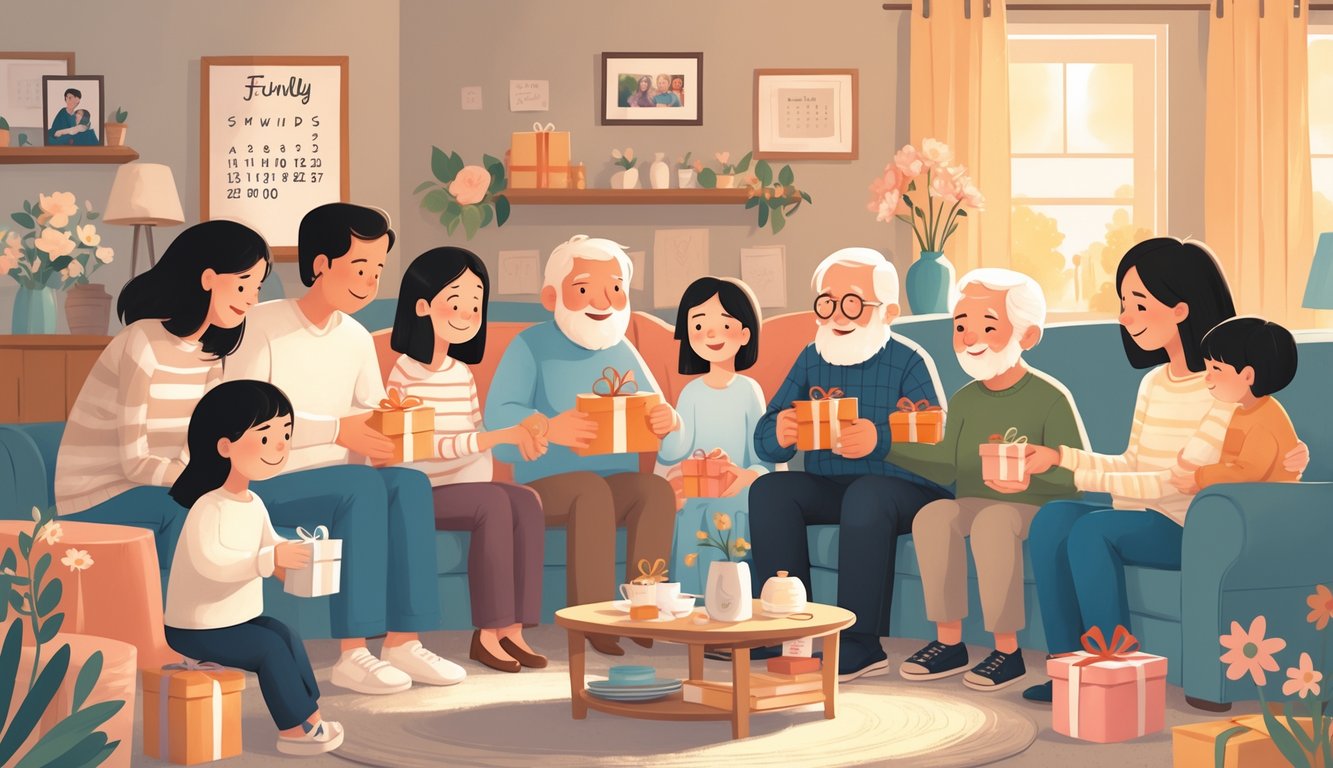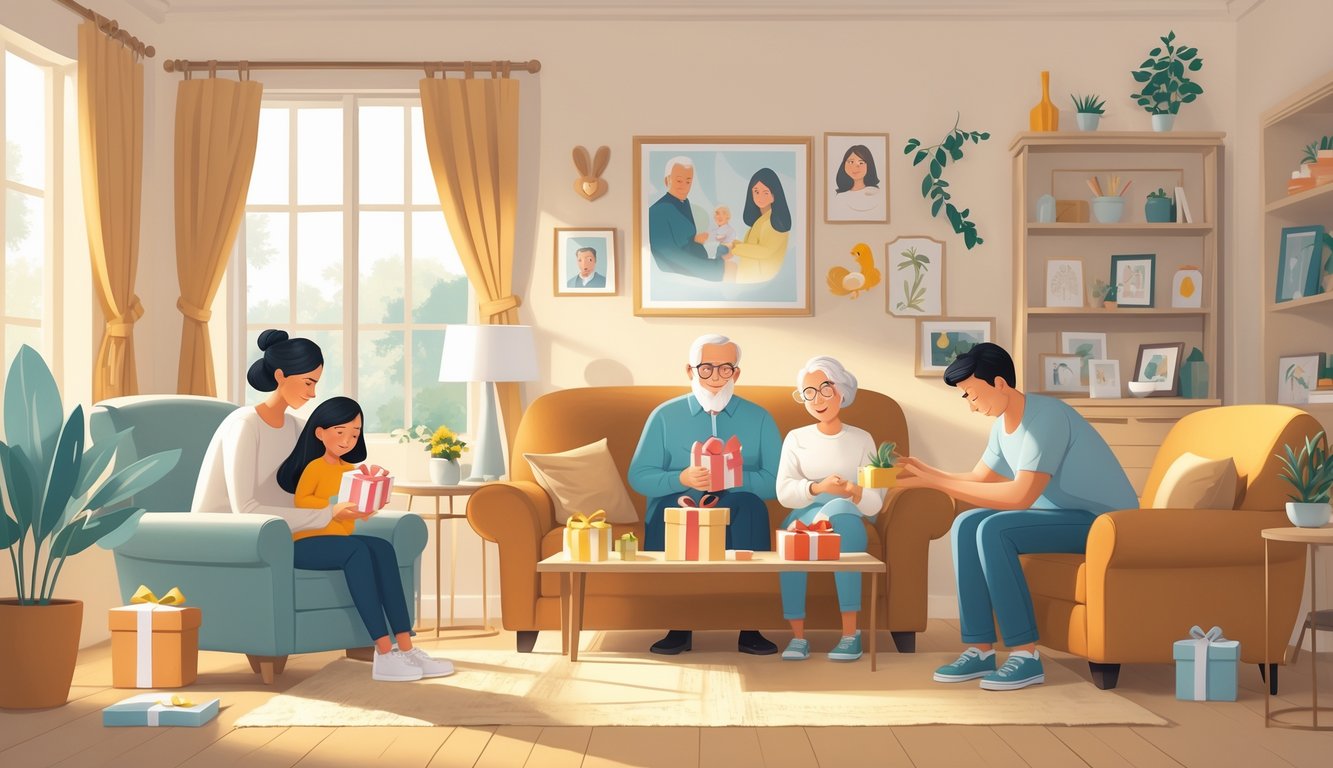
You know what’s wild? People act like families just snap back into “normal” after big life stuff—job loss, a breakup, whatever—and then suddenly you’re knee-deep in weird little gifting rituals nobody admits to starting. Like, why is there always a stash of bakery cookies in the freezer after my uncle moved out? Or, who decided flower deliveries should show up when you’re least expecting it? Dr. Laura Louis (who apparently has infinite patience) says you’re supposed to “notice” what people need instead of asking. Sure, sounds nice, but honestly, who’s got the bandwidth for that? Meanwhile, I’m still stumped about the whole “crisis = hot tea” thing. One time, my neighbor dropped off a cheese board when my car got towed. No card. Just cheese. Why?
Last week, after a hospital scare, someone told me families don’t explain these new habits—they just kind of sneak them in. Like, suddenly there’s an extra snack in your lunch, except you’re forty and it’s a DoorDash coupon or a lavender candle. It’s not about saving money or ticking boxes. It’s more like… some unspoken agreement everyone pretends to understand? Nobody admits it, but you catch on: the only plan is “let’s make today 5% less awful.” Then come the spaghetti nights, sock gifts, a dozen playlists you didn’t ask for—next thing you know, that’s just how you get through.
Major Life Events That Shape Family Gift Habits

I swear, every time something major happens—birth, death, job drama—families just rewrite the rules for gifts overnight. Nobody tells you, but suddenly you’re baking bread for your sister, or everyone’s chipping in for a fancy air fryer, and if you call it a “tradition” out loud, people look at you funny.
Defining Major Life Transitions
Here’s what gets me: a cancer diagnosis, a cousin moving to Idaho for a job she might hate, or even a fender bender—any of it can spark a new ritual. Saw a Stanford study (Mancini et al., 2019) that said 63% of families changed their gifting after “transformational” events. But what even counts as transformational? Not just weddings or babies. Sometimes it’s the weird, embarrassing stuff nobody puts on Instagram. In my family, a flooded basement triggered more gifts than my grandma’s 80th birthday. Meal trains, playlists, group subscriptions to meditation apps (Calm.com apparently made a killing post-2020)—all these hyper-specific, totally unofficial gestures just appear.
Unexpected Versus Expected Events
You know the drill for expected stuff—baby showers, birthdays, those Amazon wishlists that circulate every year. But when Dad lost his job, or my cousin bolted to Thailand, there was no playbook. We just made it up: Target runs, car repairs, freezer meals, whatever. No one coordinated, but somehow everyone knew what to do. Psychologists say gifts after surprise events are less about tradition and more about adapting and reassuring each other (APA, 2020). I’m not even sure my family remembers giving away Dad’s fishing pole after Uncle Jeff’s house burned down. Now we joke about “emergency sports gear swaps,” and I don’t think anyone outside the family gets it.
The Role of Trauma and Loss
Trauma just scrambles the rules. After my aunt died, my cousin started crocheting comfort blankets for everyone—lumpy, but full of meaning. There’s a Columbia study (Bonanno & Diminich, 2013) showing over half of families invent new rituals after a loss. It’s not about prevention, just connection, even if it’s weird.
People skip casseroles and go for memory stuff—photo albums, patchwork, playlists loaded with old inside jokes. Sometimes you get invited to a “just because” dinner where nobody brings anything except themselves. Even the anti-gift folks suddenly break character. The dog got more toys after Grandma died than she ever did at Christmas. I’m convinced there’s a PhD thesis in that.
How Families Quietly Develop New Gift Habits

Nobody says, “Hey, new rule!” But if you watch, a move, a diagnosis, or a marriage totally scrambles how your family does gifts. It’s like a new operating system installs itself overnight, and nobody reads the patch notes.
The Silent Evolution of Traditions
So, my uncle forgot my birthday three years in a row and then started mailing tiny care packages—no wrapping, just a mug with instant miso. Didn’t ask for it. Didn’t hate it. Apparently, Covey (yeah, the “Habits” guy) is onto something: families just quietly build new routines without ever discussing them. Dr. Lisa Miller at NYU says dinner rituals pop up after emergencies and then stick. But there’s never a neat origin story. If you track it (I did, once, out of boredom), you’ll see the little changes—a cupcake here, a random coupon code there.
Big gestures fade, practical gifts take over. Sometimes. Or not. When friends drift in and out, their weird gift habits get mixed in, too, and the whole thing’s a mess.
Cultural and Personal Influences
One year, everyone’s obsessed with ugly Christmas sweaters. Next year, my cousin’s boyfriend from Sweden sends minimalist kitchen gadgets. It’s chaos. British Asian families, Indian weddings, Western registry links—sure, there’s a million articles about it, but in real life, nobody’s following a TED Talk. Digital stuff takes over: Venmo, e-gift cards, virtual flowers. Nobody announces the switch. Introverts drop off gifts on the sly, extroverts throw parties. Grandparents want to knit scarves, younger siblings want to Venmo you $5 for coffee. My best friend started making donations in my name. Grandma didn’t get it but sort of respected it. Maybe.
So yeah, it’s unpredictable. Don’t try to map it out with bullet points. It’ll just make your head hurt.
Moments That Spark Change
When my neighbor’s husband died, casseroles just started piling up. Six months later, it was all about texts and ride offers. Even boring stuff—like a last-minute job transfer—can flip the script. Dr. Maria Baratta says that’s when people rediscover “thoughtful, not extravagant.” Whatever that means. Postpartum baskets were a thing for a while. Comedy socks for stress. Who knows what’s next.
Friendships, emotional gaps, personality clashes—these all force new habits, whether it’s frantic group chats or a handwritten note. Nobody plans it, but you see it in the grocery lists and the stuff that never makes it to Instagram. Sometimes these habits stick. Sometimes they vanish with the next crisis.